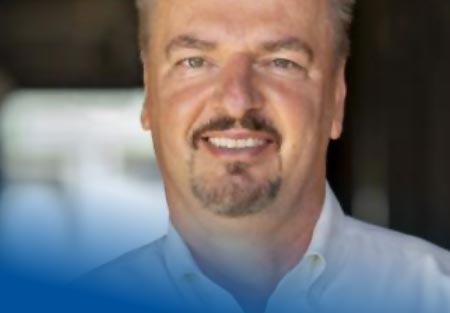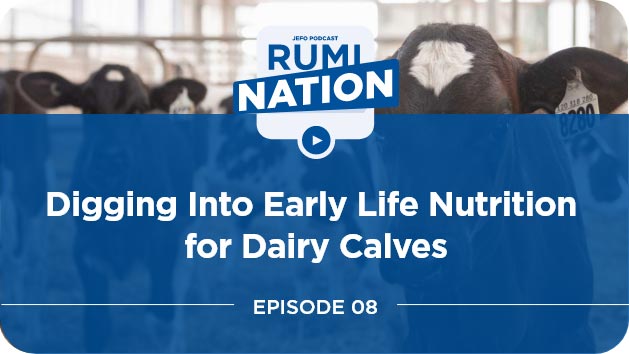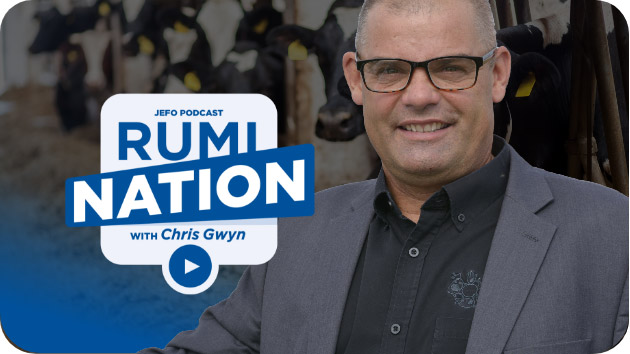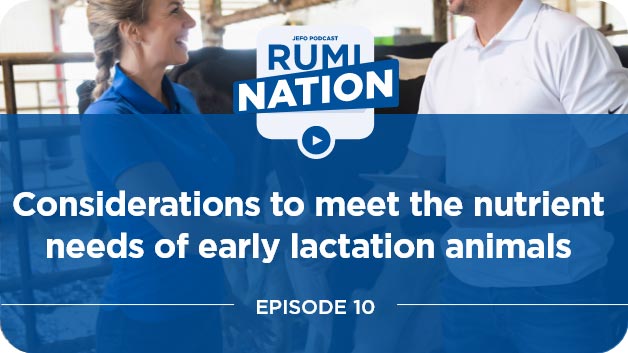RumiNation | S03 : E09
Sustainability: More than Just the Environment
Brought to you by Jefo Nutrition
Share now!
Did you enjoy this episode?
Share now!
Sustainability: More than Just the Environment
Controlling methane emissions from livestock is important to reduce all greenhouse gases, mainly CO2. Dr. Frank Mitloehner suggests five pillars on which farmers can build a sustainable environmental model.
Our guest - Dr. Frank Mitloehner
Dr. Frank Mitloehner is a professor and air quality specialist in cooperative extension in the Department of Animal Science at UC Davis. Dr. Mitloehenr is also director of the CLEAR Center, which has two cores – research and communications. The CLEAR Center brings clarity to the intersection of animal agriculture and the environment, helping our global community understand the environmental and human health impacts of livestock, so we can make informed decisions about the food we eat while reducing environmental impacts.

Timestamps & Summary
1:50
Could you summarize your findings in evaluating impact of ruminant agriculture versus what is what we often see reported in the media today?
Dr. Frank Mitloehner
There is a lot of confusion out there. That is largely caused by people not understanding how the contributions of livestock to greenhouse gases are really quite different compared to let’s say, other sources such as fossil fuel sources, because of the role that methane plays methane is the most important greenhouse gas from animal agriculture. What is often times left out of the discussion is the fact that methane, while very potent, is also short-lived. That means that once it is in the air, it stays there for about a decade or so. Then, it meets another molecule in the air that destroys it. Contrast that to carbon dioxide, which is by far the most abundant greenhouse gas, which stays in the air for 1000 years.
So, that’s not to say methane doesn’t matter. Methane matters and we try to reduce it. But methane is different in so far that if we reduce it, we can actually reduce warming by reducing methane and that makes animal agriculture part of the climate solution.
3:43
You have also presented on what we would call the five pillars of sustainability. I was wondering if you could review those for our audience today.
Dr. Frank Mitloehner
When people hear the term sustainability, they think they know what it means. To most people, it means environmental sustainability. Sustainability in the food sector is really broader than that. If you were to ask farmers what sustainability means, they would certainly list environmental sustainability as only one of the five pillars. The second one is animal welfare. The third one is food safety. Keeping the food that we produce as safe as we can. A fourth one is attracting and retaining a qualified workforce. The fifth pillar is financial viability.
5:24
What role can livestock producers, nutritionists, veterinarians and other influencers in the industries play in ensuring that these five pillars of sustainability are in fact respected and prolonged?
Dr. Frank Mitloehner
What is important is that the different players work together because when we are dealing with such a diverse set of objectives, we need to have experts from different areas working together to uphold sustainability overall. And it doesn’t happen enough. What is also important is that we communicate very clearly with the public, with policymakers and others as to how important sustainability is holistically, in all aspects, and what it takes those players to work together.
7:59
Are there any key other take home messages that you would like to leave with the audience today, in relation to the five pillars of sustainability?
Dr. Frank Mitloehner
What has really changed over the last few years is the younger generation which is more and more interested in where their food comes from, how it’s grown, how it should be prepared, how it should not be wasted, and so on. In the past, farmers were just doing what they did best: grow food. They did not really have to worry about the rest. Now, they do. And they’re not really trained to talk to people outside their profession. I think that is about to change, because people want to know, and I think that many farmers have a good story to tell, but they are too shy to tell it. They need to tell their community. Most of them have really good stories to tell and something to be proud of. In fact, our entire society should be proud of those folks, and work with them in those areas where improvements are needed.







